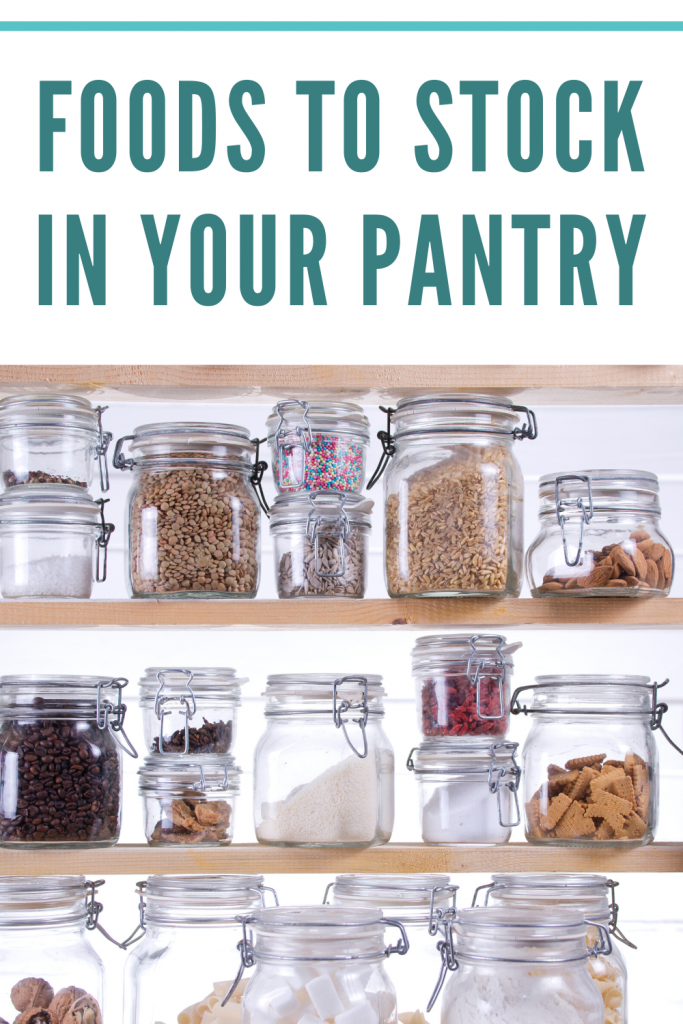Are you wondering What Food to Buy with the Coronavirus ravaging the United States and the world and a possible lockdown or quarantine coming? Schools, public places, and events are all shutting down. It’s a good idea to limit your time outside to help stop the spread of this virus. To help limit your time outside it’s a great idea to stock your pantry with items you’ll need so you don’t have to go out and before shelves are cleaned out.
Browsing around online I’m seeing moms that are wondering what foods they should buy for their families. Think about the foods your family eats, items you use, and how much you would need for 2-4 weeks. Make a list so you make sure to get everything you’ll need.
When it comes to shopping there is no need to buy out the whole store. Remember other people need to shop too. Buy what you need. There is no reason a family needs 10 packs of Costco toilet paper for a month unless you actually use that much.
What Foods to Buy to Stock a Pantry
Fruit and Vegetables
It’s always a great idea to have your pantry and freezer stocked with fruits and vegetables. They’re loaded with vitamins, good for you, and can be added to meals to bulk them up.
I like to get a mix of fresh, frozen and canned items because we eat the fresh items first and then move onto the canned and frozen. Get items that have a longer shelf life like potatoes, apples, bananas, and oranges. Oranges are a great boost of vitamin c, which is good for building a good immune system.
Canned Vegetables: Canned potatoes, carrots, corn, tomatoes, peas, and green beans are great for adding to stews, soups, and chilis.
Frozen Vegetables: Similar to canned vegetables there are a lot of great options for frozen veggies. Frozen broccoli, cauliflower, spinach, carrots, and peas are great for pasta dishes. Frozen peppers and onions are something we always have because they can be quickly used in chili, pasta, fajitas, meatloaf, and so much more.
Frozen Fruit: Frozen Fruit is great for smoothies, making fruit pops, adding to yogurt, or oatmeal. Some good frozen fruits are berries, pineapple, mango, and peaches.
Dried Fruits: These are great as a healthy snack. Dried blueberries, apples, bananas, and mangoes are always great choices.
Canned Fruit: The kids love canned fruit when the fresh fruit has run out. Tangerines, peaches, pears, and applesauce are great pantry options. Try to get fruit added to juice instead of syrup since they tend to have less sugar.
Proteins
Canned Beans: Canned beans can be eaten on their own or added to meals to bulk them up. Look for chickpeas, lentils, black beans, and any other bean you enjoy.
Seeds & Nuts: Pick up a variety of nuts, such as pistachios, pecans, walnuts, peanuts, and almonds. Seeds, such as pumpkin seeds, hemp seeds, and chia seeds, supply some protein as well as fiber. Add them to your breakfast cereal (hot or cold) or use them to top salads, sautéed veggies or avocado toast.
Eggs: Store eggs in their carton on a fridge shelf (rather than the door), where they’ll last for about three weeks. Boiled eggs will stay good in their shell for a week. While store-bought eggs need to be refrigerated, farm fresh eggs can stay out on a counter for up to a month.
Milk: Unflavored, shelf-stable varieties are a great choice for emergency situations. You might want to load up on milk made for lunch boxes, like Horizon Organic low-fat milk, to get through your at-home stay. If you’re choosing plant-based options, only pea- and soy-based versions come close or match the protein content in dairy milk. Choose no-added-sugar versions of these dairy alternatives.
Canned Meats: There is a variety of canned meats (tuna, chicken, spam, taco meat) and they can be added to stews, soups, chili, or even topped on crackers for a variety of meal ideas.
Cured Meats: Meats like summer sausage, pepperoni, and salami.
Frozen Meats: Buy meats in bulk and break them up into freezer bags so you hand meat on hand for meals.
Cheese – There is a variety of shelf-stable cheeses. Shelf-stable cheese like Velveeta, laughing cow, or hickory farms.
Peanut Butter
Jerky
Protein Bars
Grains
Dry Cereal: Dry Cereal can be eaten alone or with milk and has a decent shelf life. Add fruit, nuts, seeds, or milk to bulk it up and make it a meal.
Grains: Grains like oatmeal, quinoa, and brown rice can be added to meals to bulk them up or eaten as a side.
Pasta & Rice: Both have a long shelf life and make delicious meals. Add some meat, veggies, and sauce for a full meal.
Bread: Bread can be eaten alone, as a side, or for sandwiches with canned meat, frozen meat, or lunchmeat. Bread freezes great so you don’t have to worry about it going bad quickly.
Other Pantry Items
Canned Soups: Stocks and soups can be used to make meals, soups, stews, and cook rice. My favorites are chicken stock, beef stock, cream of mushroom soup, tomato soup, and cream of chicken soup. Plus they’re loaded with flavor in case you’re low on spices.
Canned Sauces: Sauces like marinara, alfredo, and Manwich can tie together a whole meal.
Snacks: Popcorn and crackers are great snacks. Crackers can be paired with canned meat, cheese, or fruit for snacks or a small meal. Popcorn is delicious on its own!
Flour: There are a variety of flour options available. Get the kind your family uses since these can make bread (you may need yeast depending on the bread), muffins, pasta, and so much more.
Baking Ingredients: If you have power you can bake, but even if you run out of power there are a lot of baking recipes you can cook over the grill.
Drinks: Gatorade is good to have on hand in case you get sick since you’re less likely to eat and it can replenish electrolytes and keep you hydrated. Get a good water filter and keep water in it. Plus, whatever other drinks your family enjoys.
Snacks for Kids: Kids might not understand what’s going on, so having some familiar and favorite snacks for them is a good idea. Goldfish, graham crackers, fruit snacks, ect.
Spices: We have a pretty stocked spice cabinet, but having a variety of spices on hand can help to add flavor to canned foods and meals when you have little ingredients on hand.
Others Items to Stock
Medicine: Cold medicine like Sudafed, fever reducer, cough drops, and whatever other meds you use when sick or that you need on a regular basis.
Vitamins: They help to keep your immune system strong.
Diapers, Wipes, and Formula
Feminine Hygiene Products
Pet Supplies: Food, Litter, and whatever else your pet will need.
Household items: Toilet Paper, Paper Towels, Dish Soap, Dishwasher Detergent, Laundry Soap, Hand Soap, All-purpose cleaner, and Toiletry items.
Are there some foods you keep your pantry stocked with for emergencies that I forgot to add? Tell me below and share your pantry stocking tips!




Diana @ Nanny to Mommy
Sunday 15th of March 2020
I like that you say "buy what you need". Because it is recommended to only buy a two week stock of what you personally need or what your family needs. So if you don't normally buy it, then you probably shouldn't.